A guide to the NEW way of growing up and getting what you want.
Don't wanna be here? Send us removal request.
Text
101 Secrets For Your Twenties
Paul Angone has given us exactly what we've been looking for - 101 Secrets For Your Twenties. Out of all the books out there that discuss "emerging adulthood," "life after college," or any other millennial catch-phrase, this one is the funniest, most relatable of them all.
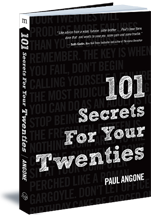
Why?
Because Paul has explained perfectly what every single one of us thinks in our heads at least 10 times per day. Everything you've gone through or are currently going through is explained in this book. It's not self-help. It's from one heart to another saying "You are not alone."
Considering I just ended my last year in my twenties this year, I can say that I was able to LOL and OMG my way through this book, reminiscing and relating left and right.
To prove this to you, here are some of my favorite secrets. Read them, love them, and pick up the book (either for you or your favorite graduate).
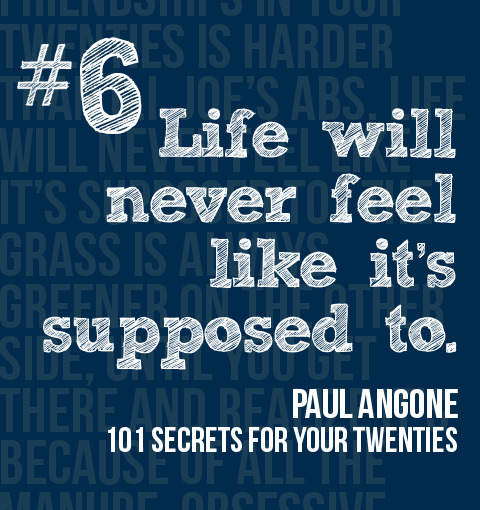
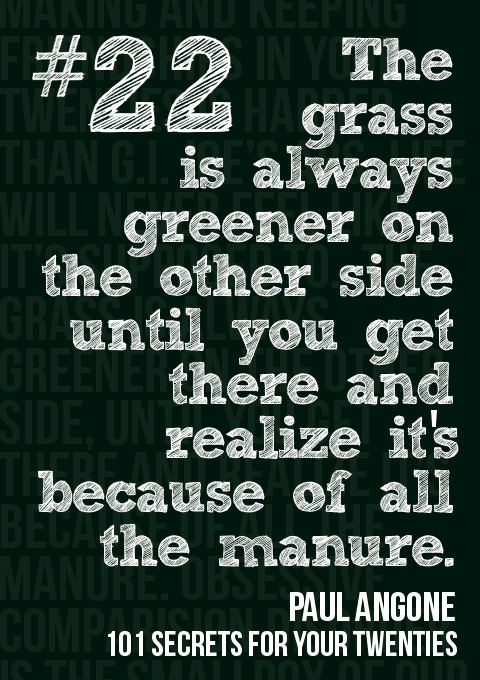
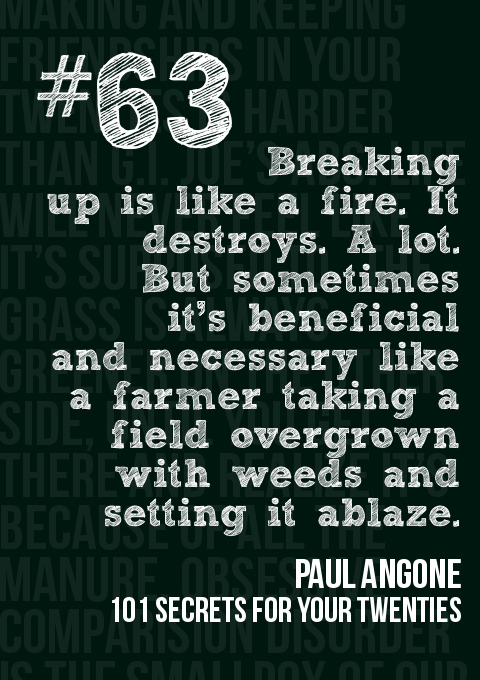
If this hasn't convinced you yet, I don't know what will. Actually, I do. Here is Paul's latest video "Stuff Twentysomethings Say." One word: AMAZE.
And here we are at his launch party in NYC. Friends united finally!
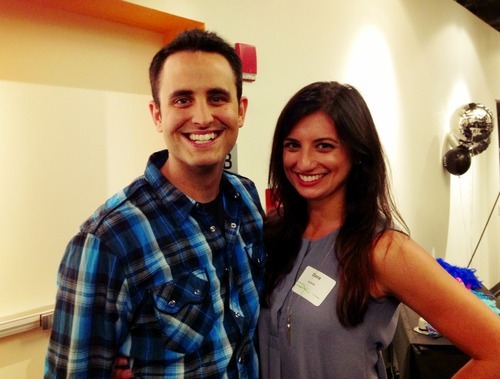
Twitter: @PaulAngone Hashtag #101Secrets Like @All Groan Up on Facebook
#paul angone#101 secrets#101 secrets for your twenties#adulthood#all groan up#book launch#new book#emerging adulthood#life after college#millenials#graduation#college graduation
3 notes
·
View notes
Text
Five Things to Know About Your First Insurance Policy
Enter: Amy Thompson
Learning to drive is an important rite of passage for young adults, but becoming a car owner might show you even more about what adult life is really like. It's a tremendous responsibility to finance, insure, and maintain your own vehicle, but it can also be a complicated world to enter into. What do you really know about car insurance? Do you know how much you need, and how much it's going to cost? Before you can legally get your new car out onto the road, you need to have a plan for finding a solid first insurance policy in place. And before you can decide on an insurance policy, there are a few things you need to keep in mind so you get the coverage you need without going broke in the process.
1. Insurance for young drivers can be expensive.
If you think that young people paying more for auto insurance is a myth, you should know right off the bat that it definitely isn't. According to AA statistics, insurance claims made by drivers under 21 are 3 times larger than claims from drivers over 30. That means insurance companies view young drivers as a huge risk. The tendency towards more reckless driving behavior combined with the uncertainty of having a limited driving history mean that finding an affordable insurance policy can be an uphill battle. It's better to be prepared for that reality. On top of that, be prepared for some insurance companies to create premiums for younger drivers that are deliberately overpriced because they simply don't want to insure them.
2. You don't have to take the first offer you get.
Studies have proven that virtually all drivers can save money by shopping around for insurance more than they do. But with younger drivers, the savings can be even greater. If you're younger than 25, the difference between the lowest and second-lowest premiums you're offered can be as high as $1,100. The Insurance Information Network of California says that while young drivers are charged twice what older drivers pay, that means they would benefit more from comparing rates. Even the cost of being added to your parents' policy can vary widely. And after you decide on an insurance policy, you don't want to stop shopping around. As you establish more of a driving history, you may be able to find cheaper and cheaper rates every year.
3. Raising your deductible can help you save.
A deductible is the amount of money you have to pay before your insurance kicks in when you get into an accident. For example, if your deductible is $400 and your accident costs $1,200 to fix, the insurance company will pay for $800. The quickest and easiest way to get a cheaper car insurance rate is to sign up for a higher deductible. The insurance company will charge you lower premiums because they don't have to pay as much of a claim. Of course, this is obviously a risk because you can get into an accident that causes serious damage and not be able to afford to fix it. But accepting a higher deductible for at least the first couple years of owning your first car might help bide the time until you can get a better rate.
4. Insurance doesn't cover everything.
When you sign up for an insurance policy, it's important to understand exactly what is covered and what isn't. Many insurance companies require you to purchase extra provisions to cover things other than the damage you cause to someone else's vehicle. You need to have collision coverage for your own vehicle, as well as comprehensive coverage to protect against theft or damage caused by natural disasters, and medical coverage if you're injured. Young drivers may not always be able to afford a thorough insurance package, which is why they have to be aware of what coverage they do have. And be careful before you let your friends drive your car. Many policies won't cover other drivers unless they've specifically been added and if your friend gets into an accident, it could be dangerous for you both.
5. You can't avoid buying insurance.
Only 3 states - New Hampshire, Virginia, and Mississippi - don't require car insurance, and even in those states, you must pay fees to cover potential accident damage to the state. In most areas, you are legally required to have a minimum of liability insurance, sometimes even before you can get your driver's license. Car insurance is important. You never know when or where an accident can happen, and while totaling your own car can be devastating, being responsible for damage or injury to another party can be even worse. Driving without insurance i a much bigger risk than you can afford to take.
Take your time when selecting your very first auto insurance policy, because it doesn't have to be as scary as it seems. Being a responsible driver is part of being a responsible adult, and that's why having the right protection matters so much.
Writer Amy Thomson is a blogger for Monkey.co.uk, a UK car insurance comparison site that can help you in finding car insurance at a great price. Follower her on Twitter @VroomVroomAmy.
3 notes
·
View notes
Text
Making the Right Financial Decisions for Your Future
Enter: Amie Gottschalk
Have you watched your parents struggle with money, especially lately? Are you worried about whether you will have financial security in your future? Most people graduate from college worried about whether they'll get the right return on their investment and be able to begin a lucrative career where they don't have to panic over finances. But not panicking over finances is about a lot more than just your career. Times are changing. Over 2 million recent college grads moved back in with their parents in 2011, and the number is expected to have risen in 2012. Whether that's happened to you, or whether you want to avoid it, the trick is to start planning for the next 20 years right now. What are the most important things to think about?
1. Choosing Your Job
Okay, it's not always that much of a choice, especially if you're new to your field and don't have a wealth of experience to bring to the table. You might be happy to just find a stable job in this economy. But no matter where you end up working, you should ask yourself what kind of financial security your company offers. Is there room for advancement? Will you be making the same salary in a decade as you are right now? By your second or third year in your company, you should be ready to assess the situation. If you're not in a job where you feel you can excel, you should be planning your next move and looking for opportunities as they come along.
2. Buying a Home
Many young people wonder what the right age is for them to think about purchasing their first house. The truth is that it entirely depends on where you are in life - your career, your savings, and your credit, as well as your plans to settle down. If you're single, you still want the chance to travel, or you're just not sure where you want to end up, you can still think about buying property and renting it out. It can be a smart investment at any age. And buying a home in this market, with historically low interest rates, could be an opportunity that doesn't come along again. If you have the means, you should do it. Just don't take the leap before you know you're ready for the cost and responsibility. Buying a house is important, but holding onto your house for years to come matters just as much.
3. Buying a Car
The number of young people buying new cars has risen in 2012 for the first time in 5 years. Young buyers have definitely returned to the automobile market, but does that mean you should buy a new vehicle? Not necessarily. You want to invest in a vehicle that meets your needs, whether it be new or used, and you don't want to get over your head with a payment that absorbs way too much of your monthly income. Used cars are typically about 12 percent cheaper than their new versions, but you want to make sure when you're shopping for one that you don't invest in anything that has had serious mechanical damage or may cost a lot to repair in the future. And factoring in promotional deals and discounts, especially in today's market, sometimes a new car actually turns out to be less expensive. It's worth thinking long term when you're shopping around.
4. Handling Debt
Virtually all of the major purchases you're going to want to make depend on your credit history, but this is not the sole reason to face your debt now. College leaves most people in a financial sinkhole, not only because of accumulating student loans, but also because of the increase in credit card debt among students. Graduates have an average of 4.6 credit cards and $4,000 in debt, and even though it doesn't seem like it, this has the potential to grow much higher when you factor in the cost of a home, bills, insurance premiums, and everything else you will be juggling in your adult life. It may be impossible to just pay it all off, but you can consolidate it. Cut down on the number of cards and make reducing your debt an active part of your life before you have a family to think about.
If you've ever seen your parents worry about bills when you were growing up, you know that balancing money issues for your household can be difficult. That's why it's important to develop good financial habits early on. With a few major decisions, you can control how your finances shape up for years to come. It's all about having the power to make your future a little brighter.
Amie Gottschalk is an avid blogger who writes often for several educational sites. You can follow her on Twitter @amiegottschalk.
1 note
·
View note
Text
Why Your Grown-up Career Should Let You Keep Growing
Enter: Amie Gottschalk
Everyone knows what it's like to think about what you want to be when you grow up, and when you're a kid, your ideas are usually a little less than practical. It's only when you get to be around college-age that you have a strong enough sense of your skills and interests, not to mention your need for financial security, to make bigger decisions about your future. How do you balance doing something you love with doing something that can give you the life you want? Choosing a career is not all that different from choosing a spouse. The number one rule you learn as you get older is that life is fluid, and that your needs, priorities, and interests constantly change. It's important to have a job that can change with you - hopefully, for the better.
1. Looking for Diversity in Job Opportunities
Whether you're interested in working in business, public administration, or the medical field, most people find their greatest chance for success lies in an area where their skills apply to lots of different jobs. In most industries, many of the careers are interdependent. You might enter your field with one career and find that another related career is much more interesting to you. Also, the jobs which are the most in demand can easily change and you might need to transition to a career where there are greater opportunities. Some industry positions are becoming more obsolete due to advances in technology, especially if you work in IT or web design. And in fields like healthcare, the high demand for new kinds of care creates new positions to be filled all the time.
2. Why Promotions Matter
The ability to transition between career paths is important in your industry, but so is ability to climb the ladder. There are many obvious reasons for this, and the first is money. There should be room for advancement in any job, even if you don't consider yourself an ambitious future CEO. If you're working in some of the fastest-growing fields in the United States, you will probably find that an increase in the number of jobs means competition for the high-paying leadership positions becomes even stiffer. It's never too late for further education, more training, or whatever you need to plan for your future.
3. The Importance of Career Flexibility
Studies show that both men and women increasingly prefer jobs with flexibility even over jobs with higher pay. Many people underestimate the importance of avoiding a 9-to-5 desk job until they're working one. Flexible schedules are great for younger workers looking to start a family, or for employees who are pursuing side interests or further education while they work. More flexible jobs can mean an easier chance for transitioning or getting promoted. You can work behind the desk in a hospital while searching for online mph programs, or you can work as a paralegal and still have time to shadow a lawyer in the courtroom. It's clear that some jobs are more flexible than others by nature, but how much freedom you get in your own schedule can depend on finding a company that is willing to work with you.
4. Knowing Your Priorities
Everyone wants achieve a good balance between work and life, but the things you value in life should be incorporated into your work as much as possible. After all, you will spend an average of 15 percent of your life at your job. If travel is really important to you, you will be drawn to careers that let you travel. Many people are inspired by working with and helping others, and if this is a priority for you, you shouldn't be stuck in an office every day. You might not live your impractical childhood dreams, but just as some of your career requirements become much more specific, others can become broader. No matter how much money you make, you will never be truly happy in your career unless you're doing something you are passionate about. And it's okay if what you're passionate about changes, even if it changes a lot.
The question of what you want to be when you grow up often has more than one answer, and the answers might not always stay the same. When you become an adult, you realize that this is normal. Some people are lucky enough to find their calling early in life, but for many more, it will keep evolving. You should expect to need room to grow, change, and improve, and if the company or organization you're working for values your contribution, they will let you. It's never too late to acquire new skills to make your personal and professional life brighter.
Amie Gottschalk is an avid blogger who writes often for several educational sites. You can follow her on Twitter @amiegottschalk.
1 note
·
View note
Text
You’re Not in Kindergarten Anymore: Practical and Exciting Viewpoints About Career Goals
Enter: Amie Gottschalk
When you were younger, chances are that adults asked you about what you wanted to be when you grew up as frequently as they questioned you about your name or age. People get inspiration about their career paths in all types of ways. A young person who watches the famous Kentucky Derby horse race on TV when they’re in kindergarten might soon feel that spark of yearning that could someday transform into a marketable career as a jockey. Unfortunately though, as we get older, that initial fervor about a seemingly glamorous career often fizzles out to become a mere glimmer of hope. Usually, this isn’t because of a lack of interest, but rather a knee-jerk reaction to the pressures of life closing in. Priorities shift, and suddenly the fight to secure gainful employment and avoid an existence that’s dominated by packages of instant ramen noodles and living in your parents’ basement outweighs the desire to do something daring.
Is Adaptability the Key to Happiness?
One of the beautiful things about being young is that we still believe that anything is within our grasp. However, adulthood is no excuse to make that boundless enthusiasm take a back seat. It’s just necessary to think creatively and be willing to adapt.
A recent survey published on Forbes.com showed that less than twenty percent of respondents considered themselves happy with their current job. It’s often said that life’s too short to plod through tasks that rob a person of any hint of vigor, and the same is true with careers. The secret to doing what you love and staying afloat too may just lie in a willingness to be flexible.
Demonstrate Awareness
Whenever you answered the question about what you want to be when you grew up, so many years ago, it probably seemed like your response was potentially life-altering. Fortunately, technology and expanded learning methods mean that there’s no reason to commit to just one career path for your entire life. Now, it’s possible to expand your education and work towards earning graduate degrees by logging onto the Internet or participating in a satellite program at local community college. These kinds of efforts could equip you for the challenges of switching careers so that you don’t feel stuck.
Do yourself a favor and try to rekindle some of that hopefulness that drove your decisions when you were young. With the right attitude, you’ll probably discover that some of your current skills or interests could make you a strong candidate for in-demand jobs that’ll challenge and excite you.
Being a grown-up doesn’t mean you have to feel like you’re stuck in a hamster wheel whenever you start the workday. Actually, it gives you the freedom to take initiative and remind yourself that the question of “What do you want to be when you grow up?” might have any number of answers. A report by Net Impact showed that over half of today’s workers want to use their job to make a positive difference. Why not take a step towards loving your job by researching a career change today? Then, at least you can start by making a worthwhile impact on your own outlook.
Amie Gottschalk is an avid blogger. You can follow her on Twitter @amiegottschalk.
1 note
·
View note
Text
How Working Abroad Shattered the Biggest, Scariest Myths about Adulthood
Enter: Kelly Dunning
I’ll be honest; a few years ago I really didn’t want to grow up.
Before I left Canada to go on a working holiday in New Zealand when I was 22, I really struggled with transitioning into adulthood. I was not looking forward to becoming an “adult” as everything that I had heard about it really didn’t sound that great.
Luckily, my amazing experiences around the world made me realize that I had been lied to. Guess what? Adulthood is not as bad as everyone wants to make it seem. All of those big scary myths about what will happen to you when you face the “real world” are just not true. At least, they don’t have to be if you don’t want them to be.
I got a New Zealand visa and worked there for six months, which is where I met my English boyfriend. Instead of going back home, I followed him to England and spent 14 months living and working in his home town in Lancashire. During that time I built up an online income as a freelance writer and now we are “digital nomads”, working while we constantly travel the world, including Europe, North America and Southeast Asia.
“Your Only Chance to Travel Is When You Are Young”
When I told older people that I was going on a working holiday to New Zealand, they all said the same thing to me, “Oh that’s great. Do it while you are young because when you get older and settle down you won’t be able to.”
I couldn’t help but be a little bit shocked by this statement. Are you telling me that there is only a small time window in my life when I am allowed to do the thing that I love the most and if I ever have a family I will be deprived of it forever? Somehow that doesn’t seem right.
After nearly two years of traveling the world and meeting travelers of all ages, I realized that the truth is not that you “won’t be able to” travel when you get older, it’s simply that most people choose not to.
If you are past your 30s and you start having kids, it’s fine to want to focus your energy on your family life and your career. However, recognize that this doesn’t mean you still can’t travel the world if you want to. Where people get it wrong is when they confuse priorities with restrictions. You are in one place because you choose to be, but not because you have to be.
Instead of buying that second car you could spend the same amount backpacking around Southeast Asia for a few months with your kids. Just Google “family travel blog” and you will find hundreds of examples of families who are traveling the world together. Not only are they enjoying their passion, but the children are having priceless learning experiences in different cultures around the world that they could never have in a classroom.
I’m not dreading getting old and settling down anymore, because I know that I will always make travel a priority in my life. I will just have to be creative and figure out different ways to do it which work best for my family.
"You Should Have a Plan for the Future"
Why is there this myth that adults have to have their life planned out in five year increments from now until retirement? Why is there so much pressure on young people to know where they will be 5 years from now?
What I learned from working abroad is that having a plan for the future is actually impossible, because you never know what is going to happen. I thought that I was going to go on a working holiday in New Zealand for six months and then return to Canada. I had no idea that I would fall in love with an English guy, move to England for a year on a UK work permit, become a freelance writer and end up working online while traveling the world. How in the world would I have planned for that?
In fact, I think having too strict of a plan for your life makes you like a horse with blinders on, missing out on all of the paths that you could take along the way. I’ve learned not to worry too much about a plan and simply do what makes the most sense to me at the time.
"Having Your Dream Career is Unrealistic"
Hey adults, why do we tell children that they can follow their dream and do anything they want with their lives, while in the same breath complaining about the fact that we have to go back to the job we hate on Monday? Why do we create this myth for ourselves that our dream lifestyle is unattainable and we have to settle for something less?
After my working abroad adventure I asked myself what I wanted to do with my life, and the answer was to make a living as a writer and travel the world. Right now I am writing to you from Kuala Lumpur, Malaysia after having been a full time freelance writer for over a year and a half while backpacking across Europe, Canada, the USA and Southeast Asia. It is my dream job and I wouldn’t change a thing.
Why do I so rarely meet other people who can describe what they are doing as their “dream job”?
Yes, it is hard, I won’t deny that. To design your ideal lifestyle takes guts, imagination, commitment and hard work. I slogged away at crappy low paying writing gigs in the evenings and weekends alongside my full time “day job” while working abroad in England in order to set myself up for the 4 hour days on tropical beaches that I have now.
But I think that the disappointment of committing for the rest of my life to a job that didn’t fulfill me would have been much worse. I don’t think that’s growing up, I think that’s giving up.
The years I spent working abroad helped me to shatter the big myths that were making me so scared to grow up. I realized that adulthood doesn’t have to be anything other than what I want it to be. I’m not going to give up and swallow these myths, but rather continue to design the life I choose.
To me, that’s what growing up is all about.
Kelly Dunning is a writer for Global Visas, the world’s leading authority on immigration and working visas. Contact them to learn more about obtaining the right visa to work abroad in another country.
6 notes
·
View notes
Text
Over 18? Time to Stop Relying on Mom and Dad
Enter: Amie Gottschalk
When you were 11, did you wish you were 12? When you hit 13, did you start looking forward to 16? Chances are that when you were 18, you couldn't wait to make it to the legal drinking age. Now that you're an adult, do you wonder why you ever wanted to grow up? Being an adult is chalk full of responsibility, and most of that responsibility costs money. Here are just five of the high costs of being an adult:
1. Housing
When you were squatting at your parents' house, it's a pretty safe bet that you weren't paying a lick of rent. If you moved out of your parents' house and into a dorm room, you probably weren't paying for that either. Once you decide to move into your own apartment, you should know that the average cost of rent in America is just under $700 per month. Mind you that this is only rent; it doesn't include any utility bills that you'll be forced to pay. You may actually be better off buying a starter home. Then again, coming up with a ten percent down payment can be fairly difficult for someone just starting out.
2. Car Payments
Did your parents buy you a car when you got your driver's license? Maybe you saved up all of your birthday money and bought a clunker to tool around town in. As an adult, are you going to be happy driving a rust bucket through the city? Other adults aren't going to be impressed with you simply because you have your own car unlike your 16 year old friends were. If you want to buy a car that you'll be proud to own, expect to plunk down about $2,000 for a down payment. Once you've given your life savings to the car dealer, you can expect to pay anywhere from $350 to $500 a month for your new vehicle thank to your lack of credit history.
3. Insurance
Are you aware of what types of insurance coverage your parents were paying for when you lived at home? You're going to quickly figure it out once you start living on your own. You'll be paying for health, life, auto and renters' or home insurance at a minimum. If you're lucky enough to be able to pay for health insurance through your employer, your premiums can be fairly inexpensive. If you're forced to pay for a private health insurance policy, you'll be paying through the nose. Of course, you can always skip paying for insurance. Doing so will only cost you your car and possibly your health and possessions.
4. Groceries
Remember being at Mom and Dad's and opening the cupboard door whenever you were hungry? If you were like most kids in America, you didn't want for at least a can of soup and your mom or dad probably had dinner on the table every night. Now that you're on your own, you'll quickly find out just how much it costs to keep the fridge stocked and the cupboards from looking too bare. While you could realistically live on a diet of Ramen Noodles, do you really want to? Even if you very carefully stick to a shopping list, you can easily spend $200 a month on food. Think that you feel like going out to eat because you're too lazy to cook? Plan on spending at least $10 per meal.
5. Entertainment
When you were 16, it was easy to bat your eyes or hold your hand out and get Dad to pull $20 out of his wallet so you could go on a date or out with your friends. Unless you plan on sitting at home every night of the week, you'll need to budget for entertainment. Cable can easily run you $100 a month if you throw the Internet in with it, a night out at the movies will cost you $20 if you buy snacks and you'll be paying for your own dates from now on. Think you want to go to the bar and have a good time with your friends? $5 for a drink isn't unheard of. Once you start paying for your own entertainment, you may consider writing your parents a thank you note for all those times they footed the bill.
There's no doubt that being an adult comes with its perks; unfortunately, it also comes with a hefty price tag. Once you start carrying your own weight, you may wonder why 11-year old you ever wanted to grow up in the first place. Not only will you have to pay for the five things above, but you'll also have to start saving for retirement, asking yourself things like "are immediate fixed annuities a good idea?" What's that old saying about being careful what you wish for?
Amie Gottschalk is an avid tech blogger. You can follow her on Twitter @amiegottschalk.
4 notes
·
View notes
Text
Change Your Mindset, Change Your Life
Enter: Pete Kontakos
Many studies, such as the one conducted in 2001 by the Harvard School of Public Health, have proven what many of us intuitively know: a positive outlook is a key component to a longer, healthier, and more satisfying life. While these studies have not been able to conclusively prove exactly why this is so, the results are hard to argue. Positivity, or a lack thereof, impacts each of us both physically and mentally and those effects can bleed over into just about all areas of life, including family relationships and careers.
What is Positivity?
Positivity is simply a predisposition to choosing to look on the good side of things rather than the bad. Positive people often report being satisfied and happy with what they have instead of lamenting what they lack, regardless of socioeconomic status. In fact, accumulating more wealth and material goods often has little bearing on happiness and can sometimes create unhappiness. Positive people maintain a focus on the good things in life and believe that they have the ability to make themselves happy. There’s also an element of control: positive people not only believe that good outweighs bad, but that they can bring about good things through their own efforts.
Impact on Physical and Mental Health
People with an optimistic attitude appear to endure the effects of aging better, have reduced incidents of disease, and recover more easily or more fully from illness. Other health benefits that are linked to positive thinking include increased life span, lower levels of stress, reduced rates of depression, and greater resistance to colds and other common illnesses. A positive outlook is also linked to a general feeling of physical and psychological well-being and improved ability to cope with hardships.
Impact on Career
Negative thoughts can create negative feelings about your career in general or your job in particular, creating a self-fulfilling prophecy that prevents you from being successful. In the same manner, positive thinking can set you up for success. A positive outlook accounts for a significant proportion of professional success, particularly in careers that focus on interpersonal communication, such as sales or management. Positive thinking also fosters self-confidence, which is a powerful tool for professional success. In addition, people enjoy being around positive people and generally try to avoid being around negative people. Being someone that other people enjoy working with will also benefit your career prospects and overall job satisfaction.
How Can You Be More Positive?
With so many benefits stemming from having a positive attitude, it only makes sense to approach life with as positive an outlook as possible. But what about those who aren’t naturally positive? The good news is that being a positive or negative person is largely due to habit. This means that you can actually train your mind to think more positively.
Below are steps to breaking the habit of negative thinking and developing a healthier habit of positivity.
Focus on looking for possibilities, not obstacles, when faced with new tasks.
When confronted with a new experience, reframe fear and anxiety by looking at things as an adventure.
Engage in positive self-talk, especially when you anticipate stressful situations.
Fake it until you make it – even if you don’t feel happy, calm, or self-confident at the moment, by acting as if you are, over time you will actually start to feel that way.
Surround yourself with positive people and allow their energy to rub off on you.
Focus on what you want, not on what you don’t want. For example, focus on becoming financially independent, not on your lack of money or your debt.
Break the habit of complaining. If you catch yourself complaining, try to stop and reframe your thoughts or remarks in a positive way. •
Avoid negative phrases, like “I can’t” or “this will never work”. These phrases condition your mind to look for negative outcomes to prove that you were right.
In conversations with negative people, try to counter their negative comments with positive comments.
By taking a few steps to become more positive, you can make real and lasting changes in your life and in your overall feelings of contentment and satisfaction.
Pete Kontakos is a contributor that writes about Leadership Training and Online Education.
Read more: http://www.hsph.harvard.edu/news/press-releases/archives/2001-releases/press11212001.html
9 notes
·
View notes
Text
Maximizing Millennials Infographic: The Who, How, and Why of Managing Gen Y
Millennials, also known as Generation Y, are entering the workplace in record numbers. They are idealistic, diverse, digitally-enabled, social and perhaps most importantly, ambitious. While these are all traits that can make a positive impact on your organization, it is a tall task to retain and motivate millennials for a variety of reasons. Their attitudes toward work and careers differ from previous generations as evidenced by the following:
- In a recent survey, millennials prioritized “meaningful work” over high pay.
- 1 in 3 millennials said “social media freedom” is a higher priority than salary.
- 70% of millennials are planning to change jobs once the economy improves.
Change can be daunting, but these factors are not difficult to embrace and can ultimately improve your company culture.
Here are some things you can do to maximize your leadership of millennials:
Empower the entrepreneurial spirit
- 92% of surveyed 21-24 year-olds said entrepreneurship education was vital in the new economy
- 30% started a business in college
Provide quality feedback
- 80% of millennials said they would prefer feedback in real time rather than via traditional performance reviews Let them grow
- 65% of millennials said personal development was the most influential factor in their current job
To learn more about the who, how and why of leading Gen Y, take a look below at the infographic we produced in partnership with the Young Entrepreneurs Council and their #FixYoungAmerica campaign.
Via MBA@UNC Online Business Degree & The YEC
6 notes
·
View notes
Photo
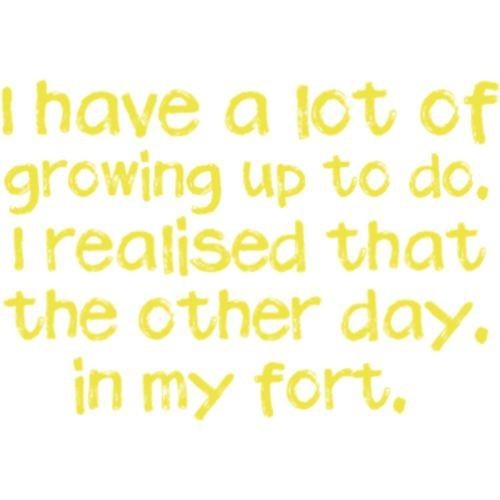
I have a lot of growing up to do.
I realized that the other day.
From my fort.
3 notes
·
View notes
Text
Your Fears Are Not True + Updates + Free Stuff
“As for your fears, remember this: they aren’t true.”
I wrote this to a student who is currently in the same graduate school program I completed a few years ago when she contacted me for advice on her career after graduation.
I often receive emails from potential students asking questions about the program, the faculty, and career opportunities so they can decide if they should enroll or not. This particular student was different though because she was only a few months away from graduation and she really opened up to me about the overwhelming stress she was feeling.
She was afraid. Afraid of not being recognized by big companies. Afraid of not being an attractive candidate. Afraid of not being seen at all through the sea of resumes that inundate companies every day.
She had a great resume, great experience, and great education. But she was still scared. Everything around her was moving so quickly and changing so rapidly that her normal relaxed mentality disappeared to let fear and anxiety take its place.
Click here to continue reading this post on the HireFriday.com website. I give you actionable steps you can take immediately to make your fears disappear.
Updates:
I would love your vote so I can win a small business grant. Many small businesses around the country are entering this contest to win, but to even be considered, you need 250 votes.
That's where you come in. I'm applying for the grant under my business, DianaAntholis.com, wellness coaching and fitness training. Go to my site to learn more about it and download a FREE guide with audio workouts, a healthy living podcast, a guided meditation, and 50 healthy snacks to keep you fit and sexy.
To vote: Click on this link: https://www.missionsmallbusiness.com/ On the bottom right of the page, click "Log In and Support" It will log you in through Facebook. Then go to the bottom and type in the search box: "Diana Antholis" My information will come up and just click VOTE next to it.
Thank you!
#fears#job search#career#mission small business#grant#dianaantholis.com#wellness#fitness#lifestyle#free#conquer your career#e-guide
6 notes
·
View notes
Text
Happiness is a Choice, Cholesterol, Fantasy Relationships, and Non-existent Weddings
There are going to be many times when you think that being an adult totally sucks. You have all this responsibility for yourself. Ugh, who wants that?
- Jobs aren't just ways to pay for booze anymore. You need to pay rent, buy work clothes, and get a haircut.
- Relationships aren't just living out fantasy movie scenes. They get real...fast.
- You actually care what your cholesterol levels are...and talk about it with your friends.
- Your friends start to co-habitate, then decide to make it legal in front of lots of people, then decide they are apparently responsible enough to bring another human being into this world--and you wonder if this is something you are supposed to be doing.
- You start wishing you were 35 just to get away from the uncertainty of your 20s.
- You see people making Pinterest boards about their non-existent weddings and wonder what the heck happened to two people falling in love and being best friends for the rest of their lives instead of one day of overabundance.
But being an adult-or rather, being a human being-is about choices. You can choose to live your life the way you want to. You don't have to conform to society. You don't have to follow someone else's path.
You can create your own path. But sometimes creating your own path is really scary. Wouldn't it be easier to just have it laid out for us so we don't even have to think about it?
That's part of being an adult. Thinking. Feeling. Understanding. Knowing when the voices in your head are telling the truth and when they are fabricating fat, juicy lies. Not being scared to take a risk. And most importantly...
Understanding that you can choose happiness. Happiness does not come from external factors. Your feeling of self-worth does not come from the external environment - even though we've been conditioned to think that way. That piece of paper from the Ivy League school or the promotion may make us temporarily happy, but rarely do they fill us up and leave us to be completely happy and fulfilled.
I used to think this was my key to unlocking the best life, so I kept going and going until I realized that I wasn't becoming as happy as I thought I would. What I know now, and consistently work on every day, is understanding that I can choose to be happy with my life and I can choose to surround myself with people who think the same way.
Get clear on what you want--and take a stand.
#happy#happiness#adulthood#Pinterest#non-existent weddings#health#relationships#job#career#conform to society#creating your own path
3 notes
·
View notes
Text
The Careerist's Manifesto Book & Poster Giveaway
Enter: Megan Atkinson

Megan just launched her new ebook "The Careerist's Manifesto" and awesome colorful posters to go with it. Below is an interview with her and she is fantastic enough to give away one manifesto and one poster of choice to a lucky reader!!! (Click here to check out the options at her e-store.)
Ways to enter:
1) Leave a comment below. (1 entry)
2) Send a tweet linking to this post and mentioning @DianaAntholis and @EnergyCareerist (click the tweet button in the upper right side of this post) (1 entry)
3) Share on Facebook tagging Enter: Adulthood and Energy Careerist (1 entry)
4) Become an email subscriber and receive 5 entries! Current subscribers don't have to do anything. Click here to become an email subscriber.
Feel free to do all four! Contest ends on Sunday, April 1st.
Interview
Diana: This manifesto is a compilation of what you've learned over the years in the working world. What made you decide to write it up for your peers?
Megan: I actually stumbled upon the motivation to write this by accident. I had just accepted a new, amazing job and as my last day at the old job neared, I found myself thinking a lot about a close co-worker of mine. He would warn me of his impending doom of baldness from pulling his hair out so I would read him a motivational quote to soothe his worries. I’d whine that my premature gray hair was from our crazy deadlines so he would draw a goofy picture on a sticky note to make me laugh. I felt compelled to write him a special note with a collection of my obnoxiously endearing affirmations that he could look at to get through rough days after I had moved on.
That letter quickly evolved into a list of quotable bits pulled from my own journey, rather than stolen from someone amazing and famous. Because I’m an ardent believer of sharing and supporting fellow career enthusiasts, I just had to take the list to the next level. A few weeks later, The Careerist’s Manifesto was born.
Diana: What is the number one piece of advice you want readers to digest from reading this?
Megan: Wow, that’s a tough question. There are so many valuable lessons and mantras in this book! I guess if I had to choose just one, it would be that we careerists don’t have to travel this journey alone. Whether it’s learning from one another or offering a shoulder to lean on, there is a huge community of folks out there facing the same struggles and experiencing the same triumphs. Utilize that community to bolster your strength and your badassery.
Diana: The book is beautifully designed. What made you make it more artistic than a typical e-book?
Megan: Thank you so much! It was a tough decision. On one hand, I wanted the book’s message to reach as many people as possible so a traditional eBook format would have been ideal for that. On the other hand, I felt like the quotables needed to be showcased in a big way and that anyone who would be interested in reading the book deserved to get punched in the face with some gorgeous, typographic wisdom juice. The term “wisdom juice” sounded cooler so I went for that option.
Diana: You love the energy industry. Was this something you always knew or did you discover it after you graduated?
Megan: Ha! I love answering this question. My dad is maniac – and I mean that in the most loving, loyal-daughterly way possible. Growing up, Pops would follow me and my mom around the house flipping off light switches and harping on us about wasting energy… so I suppose it was something emblazoned in the back of mind from a young age. I didn’t really discover my passion for the energy industry until I was about to graduate with a degree in political science and zero desire to put it to use after my experiences as an intern and volunteer in that space. Renewable energy was just starting to pick up major media coverage and it was a political issue I was incredibly interested in. I picked up a wind energy class my last semester and fell in love. I decided to start on a second degree right away and that was it. I was HOOKED. Since then, it’s been eat, sleep, and breathe all things energy – lather, rinse, repeat!
Diana: What are your upcoming goals for EnergyCareerist.com? What else can readers expect from you?
Megan: This is a big question! EnergyCareerist.com originally started as a place for me to work on my writing skills but it’s evolved into more than that for me. My goal is evolve the site from a blog into a comprehensive resource for career development and support for folks aspiring to break into the energy industry or take their existing careers to the next level. I’ve still got a ways to go until it gets there but there are some HUGE plans in the works right now.
Later this year, I’ll be releasing at least two more eBooks that I am super excited about. “Being Middle Brained” and “To-Do Becomes Ta-Da” will likely surface the second half of the year but they’re both going to be jam packed with killer career advice sprinkled with gusto and fun. Also, 2012 has brought a shift in focus to the blog. Like my eBooks, I’m really digging deeper into content that provides value to all careerists, not just energy pros. I am writing about topics that are especially important to the energy industry nuts but that can be applied to all career paths. No Careerist Left Behind!
Grab a copy of Megan's "The Careerist's Manifesto" as well as beautiful print posters in her e-store. Click here to access the Energy Careerist Emporium. PLUS the manifesto is 50% this week only so hurry! (Read up top to see how you can win a copy of the manifesto and a poster!)
Click here to hear what others are saying about the manifesto.

Megan Atkinson is a project manager by day, helping evolve everyday life to include greener and smarter energy systems. After hours, you can find her transforming the energy career development arena over at the The Energy Careerist. She believes wholeheartedly in the power of tenacity, innovation, and a great glass of wine. Follow her on Twitter or Facebook for more juicy career advice.
11 notes
·
View notes
Text
35 Ways to Live Happily Ever After - Book Giveaway & Happiness Blog Tour
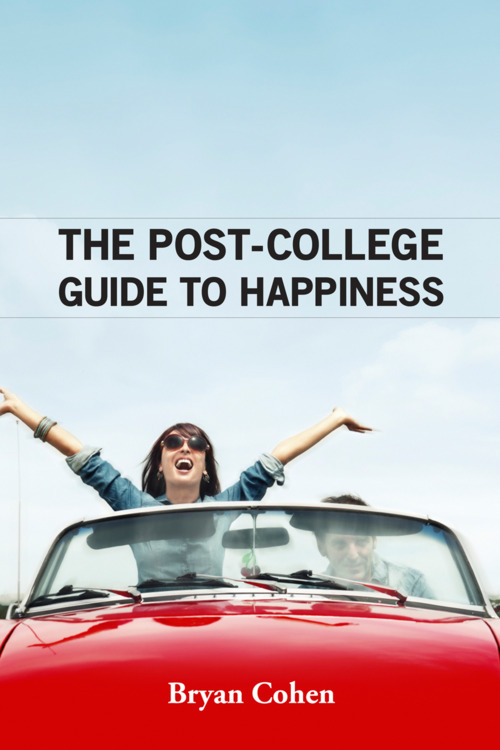
Enter: Bryan Cohen
Bryan is the author of his new book The Post-College Guide to Happiness and is currently conducting The Happiness Blog Tour. He is giving away free digital review copies of the book and doing a giveaway for paperback copies, audio copies and even a Kindle Fire! Read on and check out the info below the post to find out how to enter!
"It is only possible to live happily ever after on a daily basis." - Margaret Bonanno
Practice Makes Happy
The best question to ask after the fairy tale ends with a "happily ever after" is "How did they do it?" Did the prince and the princess simply never fight because their love was too strong? Did they listen to each other with compassion and empathy even when the other one was completely out of line? What about when they had kids and had to get up at three in the morning to feed them?
This doesn't just have to be in terms of the perfect fairy tale relationship either. What about the stories of individuals who seemingly became successful and happy? Did they just magically end up being happy for 40 consecutive years due to luck or fate?th a "happily ever after" is "How did they do it?" Did the prince and the princess simply never fight because their love was too strong? Did they listen to each other with compassion and empathy even when the other one was completely out of line? What about when they had kids and had to get up at three in the morning to feed them?
What Bonanno is saying here is that happily ever after isn't a cake walk. It takes effort every day that you can't ever take for granted. If you fall out of practice with happiness, even if you're destined for happily ever after, it might take you a while to get back into shape. Building up your happiness muscles requires a happiness workout routine.
In my book, The Post-College Guide to Happiness, I have set out 35 different exercises that a person looking for that happily ever after could use to slowly, but surely improve his or her levels of happiness. It doesn't take finding the prince or the princess or the perfect job to ensure happiness. The only way to make it a constant reality is to make it a priority and focus on it every single day. The exercises are helpful because they are an actual physical thing you can do each day to make progress toward happiness.
For instance, if you're trying to make your relationship into a fairy tale marriage, try creating a gratitude list once a week or once a day. During a set aside time, take out a pad of paper and start writing things that you appreciate about one another. You may never be Prince Charming and Sleeping Beauty, but by adding this exercise to your routine, you'll certainly be more civil toward each other.
If you aren't having as much luck in your job as you'd like, try adding a burst of enthusiasm to your career, real or made-up. Even if you pretend to be enthusiastic during the job that you'd rather not be doing, you will almost start to believe in the game and you will be more productive and fulfilled. Try the burst of enthusiasm once a week or even more often to full a boost in your energy and happiness.
Exercises like these, when done frequently, can make a major difference in your practice of happiness. Keep at it every day and you'll eventually live happily ever after, even if you had to work for it.
GIVEAWAY
Bryan Cohen is giving away 61 paperback and audio copies of The Post-College Guide to Happiness and a Kindle Fire between now and May 7th, 2012 on The Happiness Blog Tour. All entrants receive a free digital review copy of The Post-College Guide to Happiness. Bryan hopes to give away at least 1,000 copies during the blog tour. To enter, post a comment with your e-mail address or send an e-mail to postcollegehappiness (at) gmail.com. Bryan will draw the names at the end of the tour. Entries will be counted through Sunday, May 6th.

Bryan Cohen is a writer, actor and comedian from Dresher, Pennsylvania. He graduated from the University of North Carolina at Chapel Hill in 2005 with degrees in English and Dramatic Art and a minor in Creative Writing. He has written nine books including 1,000 Creative Writing Prompts: Ideas for Blogs, Scripts, Stories and More, 500 Writing Prompts for Kids: First Grade through Fifth Grade, Writer on the Side: How to Write Your Book Around Your 9 to 5 Job and his new book, 1,000 Character Writing Prompts: Villains, Heroes and Hams for Scripts, Stories and More. His website Build Creative Writing Ideas helps over 25,000 visitors a month to push past writer's block and stay motivated. Feel free to follow along with the tour at The Happiness Blog Tour Hub Page or on the book's Facebook Page.
6 notes
·
View notes
Photo

Gen Y Working Women Infographic by Accenture
In honor of International Women’s Day, Accenture has released an infographic that features breaking research about Generation Y’s struggles and needs in today’s workforce. “The Next Generation of the Working Woman” illustrates how Gen Y women currently see the potential to break the glass ceiling, but haven’t found the keys to unlock it. For example, only 45% of Gen Y women have asked for a raise, but of those who asked, 75% received one.
Click here for more information.
Click here for a PDF of the file or click the image.
1 note
·
View note
Text
Exclusive First Look at Minted Magazine's Spring Issue
Minted Magazine is a new online publication empowering women in their lives and careers.
We’re suckers when it comes to a sparkly pair of heels. We prefer to channel our inner Julia Child by preparing meals at home. We’re constantly searching for the path to financial success by analyzing the latest stock market trends and our spending habits. The problem is, we’ve had to turn to so many different people to find the information we need when it comes to fashion, health, beauty, business advice … and life in general! We thought, “Wouldn’t it be nice to have one single resource to turn to?”
And then Minted Magazine was born.
Founders Kimberly and Shirley want you to have an exclusive first look at their Spring issue. You can enjoy the January 2012 Premiere issue on their website now and I have to say that I was quite impressed with the design and content.
So let's take a first look at the upcoming career, fashion, and food posts!
Quote from the Feature:
"Our field is so competitive with so few women executives in the workforce— it's 3 percent of women. Women make up 56 percent of the workforce, so we're underrepresented and it makes us more competitive than supportive. A lot of it [my work] is to drive women, once they make it above the glass ceiling, to pull someone else up." - Cover girl, Molly Cain CEO and Co-founder of Glass Heel.
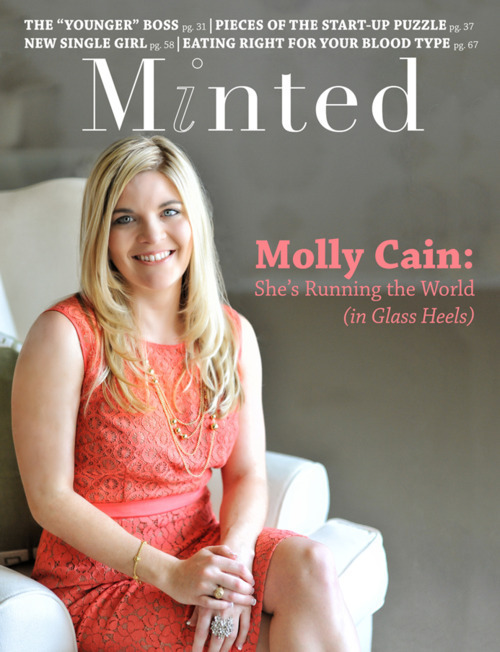
Incorporating yellow and nautical stripes this Spring.

Quick and healthy brunch recipes.

Yum!
The entire issue is launching on March 12 so be sure to check it out! Thank you ladies for letting us look at what is coming up!
Follow on Twitter @mintedmag
Follow on Facebook Minted Magazine
Website mintedmag.com
2 notes
·
View notes
Text
Why Knowing Exactly What You Want to Do is Overrated
Enter: Lauren Aloise
Some people are born knowing what they want to be when they "grow up". Others pretend that they know, following one path or another usually based on the opinions of parents and teachers and the happy endings in Hollywood movies. Then there are people like me. I'll turn 26 this year and still have no idea what I want to “be” one day. Sometimes this uncertainty produces mini panic attacks and feelings of despair... but over time I’ve learned to reflect on the things I've already "been" and smile.
By the age of 26 I'll have been:
A Student: I was poor, super busy, and stressed, but my objective in life was to learn! How cool is that?
A Waitress: I learned everything I know about food and wine from a variety of talented chefs throughout my years waitressing. I also learned to stand up for myself amidst a group of money hungry servers and a borderline abusive kitchen staff. I quickly realized I never wanted to be the person who asked for their filet mignon well-done-- bad idea.
A Receptionist: Answering phones may not sound like much fun, but when you do it at a busy law office you learn to put up with some crazy callers while simultaneously becoming an expert multitasker. "You cut your finger while chopping a carrot? Because the knife was too sharp? You'd like to sue for $500,000? I'll connect you to the attorney's voicemail right away." And... I’d hang up.
An ESL Teacher: Imagine getting paid to speak to people in your own native language. Welcome my life as an ESL teacher. I try to choose conversation topics that I'm actually interested in, which often makes class as easy as talking to a friend. Not to mention how much I've brushed up on English grammar, always a marketable skill in the future.
A Cooking Instructor: Living in Spain and spending time with my Spanish mother-in-law has made me more than proficient in southern Spanish cuisine. I started offering cooking classes to people who wanted to learn how to make some very popular Spanish dishes. Getting paid to cook, eat, and drink? Yes, please!
So you see, not knowing the answer to one of the most common questions a child is asked has turned out to be a defining factor in my life. Instead of being a 26-year-old doctor who will retire in 40 years as a doctor, I'm a bilingual ESL teacher and part time cooking instructor, aspiring writer, ex-waitress, and talented call screener. Unlike many people who already know their life plan, I feel really lucky to still have some surprises in store. So if you don’t know what you want to be when you grow up, stop dwelling on it and think about what you’ve already been!
Lauren Aloise is a young entrepreneur fighting back against the recession in one of Europe’s worst economies. She currently lives with her husband in Madrid, Spain and pays the bills as an ESL teacher, cooking instructor, and writer. You can check her out at Spanish Sabores where she shares about the ups and downs of expat life and provides travel advice and information about Spanish food and culture. Follow her on Twitter and Facebook too.
9 notes
·
View notes